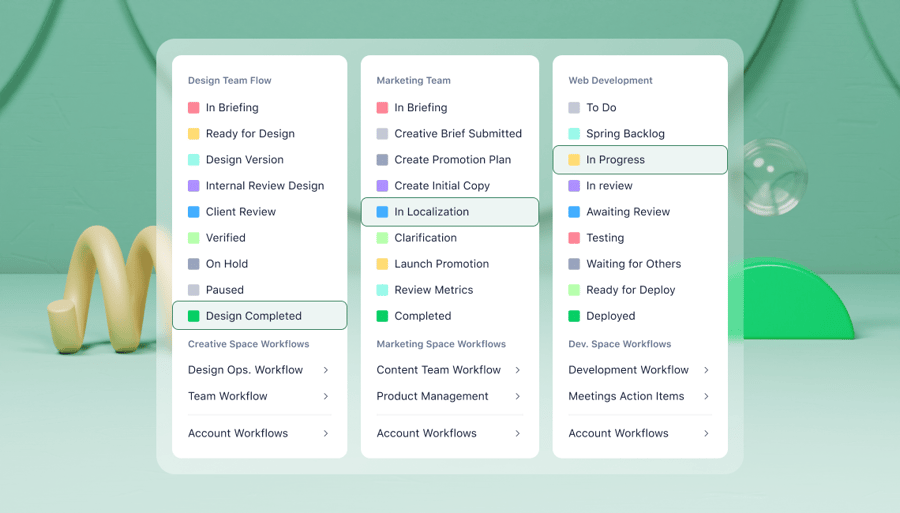Passion and dedication can only get your business so far. To truly propel business growth, you need calculated processes to control costs, enhance productivity, and maintain customer experience standards. That’s where business process management software comes into play.
The global market for business process management (BPM) was estimated to be worth $3.3 billion in 2020 — and that number is expected to grow to reach $4.7 billion by 2027. One recent report found that 68% of organizations deem business process management an important task at the managerial level. This is the reason business management processes are essential regardless of business size.
Here’s a comprehensive guide on managing your company’s business processes while leveraging the power of automation.
What is business process management (BPM)?
Business process management (BPM) defines how a company creates, assesses, and maintains the business processes that form any organization’s core. This includes discovering, modeling, analyzing, measuring, improving, optimizing, and automating business processes. The desired outcome of these activities is to enhance the enterprise’s performance while maintaining business agility and operational excellence.
Essentially, business process management offers a holistic approach to fulfilling a company’s objectives and milestones. This is accomplished by fine-tuning all processes that become inefficient or unreliable and using metrics and analytics to identify the changes needed.
The usual framework for improving business process management includes:
- Lean
Lean is a methodology that eliminates all the unnecessary tasks from the processes. Lean methodology creates more value for customers while utilizing minimum resources. - Six Sigma
It’s a quantifiable method of improving the business processes through the evaluation and elimination of defects. - TQM
TQM, also known as total quality management, is a framework for improving processes and services through continuous feedback. - Lean Six Sigma
It’s a hybrid process that eliminates unnecessary tasks to make business processes more efficient and cost-effective.
Why is business process management important?
Business process management is important for reducing the cost of expenditures by streamlining workflows and maximizing resources. This enables you to see aspects of your business that need improvement to avoid hold-ups and unnecessary expenses.
With BPM, you get clarity into your business projects’ key weaknesses so that you can devise more targeted strategies to prevent bottlenecks and obstacles. Strategically map workflows with detailed protocols.
Lastly, it allows organizations to take a more systematic approach when evaluating their workflows. This way, they can assess their resources and their interconnection with the business processes to avert any unforeseen situation. This makes it easier for companies to find solid ground whenever market trends or industry regulations make a shift.
These are some of the most compelling reasons why business process management is vital for an enterprise when enhancing its operational agility.
Why is process management important?
Process management is one way to achieve the highest quality, productivity, and performance within an organization.
With the right process management protocols and strategies, you can overcome potential obstacles and bottlenecks that might arise, thereby increasing the effectiveness of business activities.
What is business process management software?
To effectively oversee and organize business processes, business process management requires intelligent tools that automate and optimize business processes. These technology tools, specifically business process management software, enable companies to map out daily processes, search for potential roadblocks, and eliminate them beforehand.
Moreover, they increase daily efficiency by automating the entire process where data is collected and transferred to and from third-party software and applications.
What is the difference between business process management software and workflow software?
Workflow software is an automation tool used for assigning tasks to users. Workflow software ensures that the work is passed through the entire process promptly and efficiently.
It can also offer information and support in the form of housing documents and other resources related to the process.
On the other hand, business process management software is more structured than workflow software, offering increased transparency and control.
A business process management tool monitors and assesses processes in real time, alerting responsible users whenever a process or task reaches completion.
It is a comprehensive tool that not only automates workflows but optimizes them and increases their efficiency.
What is the difference between BPM and ERP software?
ERP or enterprise resource planning software offers access to a collection of apps. This software combines with all departments of an organization to collect real-time data from a common database. This way, all the business processes are performed while working with the same data.
This eliminates any possibility of doubt or confusion as all the employees work with the same information giving rise to effective business decisions. What is the goal of enterprise resource planning software? It offers company-wide access to data across departments to be utilized for purchasing, payroll management, inventory management, manufacturing processes, etc.
On the other hand, business process management software encompasses all the strategies involved in automating and improving business processes, not offered by ERP software. BPM software provides a method evaluating and monitoring tool that can be used for designing strategies and editing and modeling them.
A business process management tool offers workflow management. ERP’s only offer entire modules that can be costly if you don’t make the most of them.
What to consider when buying a business process management software?
Once you are ready to invest in business process management software, consider these five items to make the best decision:
- Customer testimonials
Seek out customer testimonials and stories to gauge its effectiveness. Look out for reviews and customer success stories that illustrate how different businesses made the most of the software solution. - Technical and customer support
Look for a solution that offers timely customer support. Good customer support is essential, especially in the deployment phase. - Technical resources
Look for resources and tutorials that allow customers to educate themselves on the software and its features. - Advisory capability
Search for a vendor that wants to partner with you rather than making a sale. They should be diligent when offering guidance rather than just highlighting the best features of the solution. - Flexible and robust features
Most importantly, the software you choose needs to have flexible, easy-to-use, and robust capabilities. This will allow you greater control over your business process management protocols and ensure your software can scale with your business. Consider what is process automation in software project management? Automation is vital to save time and money in your business process management, and the right software will allow you to set this up quickly and easily.
Why choose Wrike as your business process management tool?
As a business process management tool, Wrike offers multiple features for businesses of all sizes and industry types. Use Wrike to measure, optimize, and automate business processes through a combination of features and integrations.
Request forms, integration capabilities, and reporting tools make Wrike the right choice for efficient business process management. Get started today with a free two-week trial.









